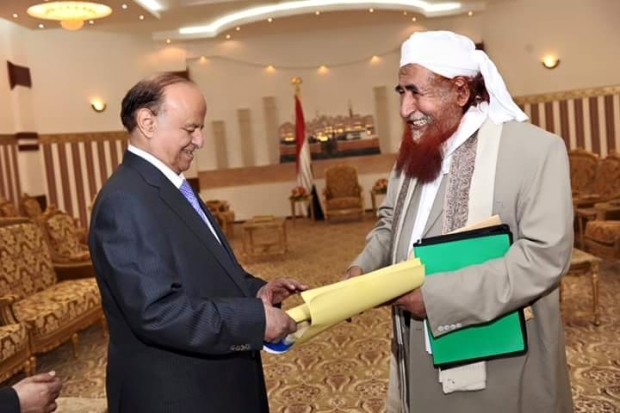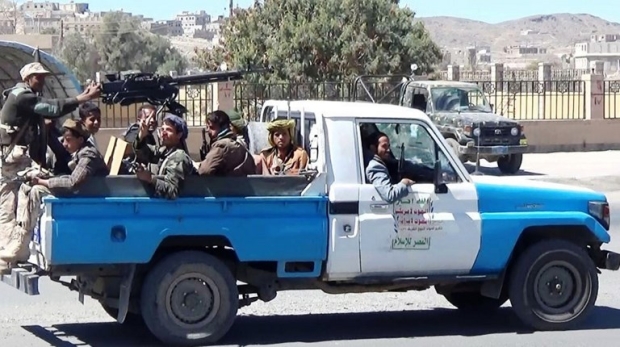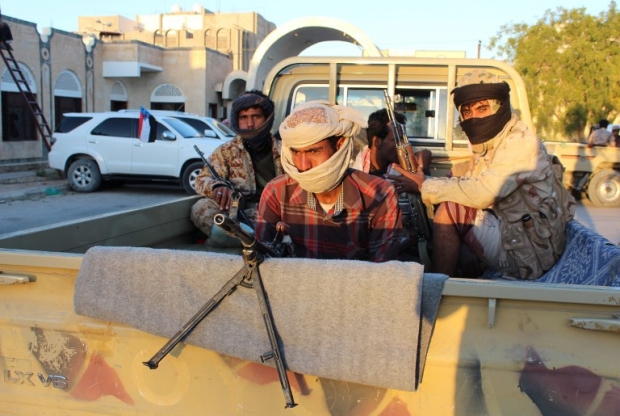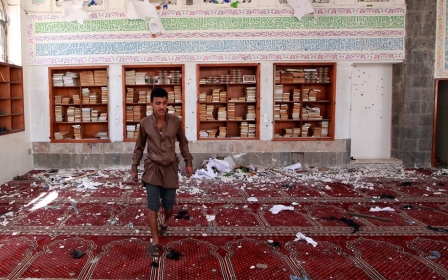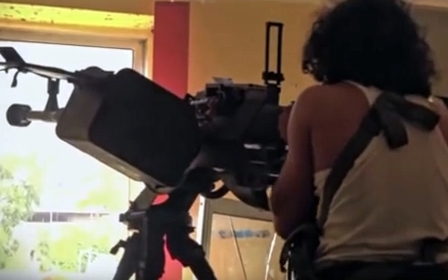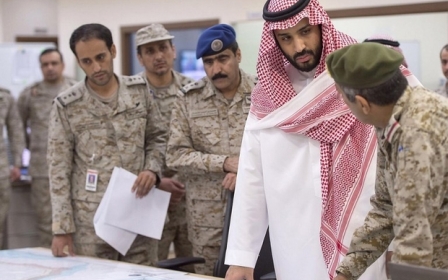Saudi terrorvision: Al-Qaeda chiefs become stars of Saudi TV
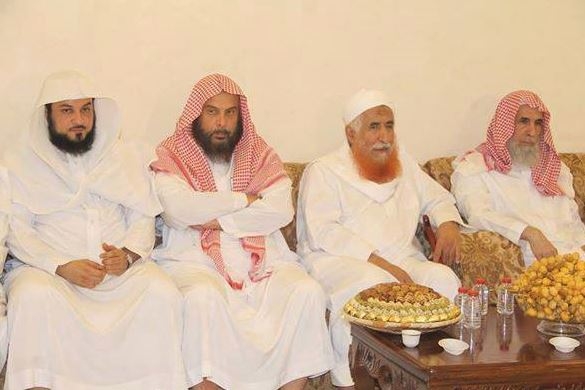
SANAA - What at first perhaps looked like any regular hospital bedside visit between two old friends catching up was anything but.
In footage aired on an anonymous YouTube channel early in 2016, an elderly Yemeni cleric visited his Saudi peer, Aaidh al-Qarni, in a hospital in Riyadh, and brought good news from the battlefront next door.
"I've got good news for you from Taiz," says Abdulmajid al-Zindani, who supports the Saudi-led war against Shia Houthi rebels in Yemen.
But Zindani, who is apparently allowed to operate freely in Saudi Arabia, is a veteran al-Qaeda supporter, and in 2004 found himself on the US Treasury's specially designated global terrorist list.
"Allah Akbar, Allah Akbar," people chant in the background.
"And soon, God willing, it'll be Sanaa [Yemen's capital]," adds Zindani, a former spiritual adviser to Osama bin Laden.
Abdulmajid al-Zindani meeting Saudi cleric Aaidh al-Qarni, in footage released in early 2016While Zindani has kept a low profile over the years, he has retained his influence and the respect of his peers of the Wahhabi creed in Yemen and the Gulf.
But Zindani is far from alone in making such public appearances, and over the last few years Saudi Arabia has become a hub for hosting Islamist radicals.
Shadowy relationships
Such public appearances, many on TV, offer a rare window into the kingdom's shadowy and often harmonious relationship with what some would term "extremists".
Two sources in Riyadh suggest that at least five Yemenis designated as terrorists by the US Treasury have advised and coordinated Saudi operations in Yemen with allied forces on the ground, in a Saudi bid to restore president Abd Rabbuh Mansour Hadi, who was toppled by a Houthi rebellion, at first supported by former president Ali Abdullah Saleh's loyalists in the military.
The US terrorist designations themselves back up these claims.
Yemen's al-Qaeda branch, al-Qaeda in the Arabian Peninsula (AQAP), is regarded by US as the most lethal of its global offshoots.
During his stay in Saudi Arabia, Zindani has been warmly received by senior clerics and officials, including Sheikh Saad bin Nasser al-Shithri, a cleric appointed in 2015 as an adviser at the Royal Court.
In another YouTube video showing their meeting, which was later removed, Zindani praised Saudi's regional leadership and its success in creating the Islamic Military Alliance to fight terrorism, created in 2015, as this "wouldn't have happened in the past without prior consent from world powers".
As of 2016, al-Qaysi was a senior AQAP official and a financial supporter of AQAP. At that time, he obtained some money for AQAP from parties outside Yemen
- US Treasury
Nayif al-Qaysi is another Yemeni designated in May 2016 by the US as a specially designated global terrorist. He's a leader of an anti-Houthi group and was appointed by Hadi as governor of Bayda in December 2015, a position the Treasury said was used to further facilitate the expansion and settlement of AQAP in Bayda, AQAP's main stronghold and Qaysi's birthplace.
The Treasury said that Qaysi provided AQAP and allied tribesmen with weapons and money to fight against the Houthis.
"As of 2016, al-Qaysi was a senior AQAP official and a financial supporter of AQAP. At that time, he obtained some money for AQAP from parties outside Yemen," it wrote.
"He delivered aid to AQAP and used his position as an al-Bayda governorate, Yemen, political leader to facilitate the expansion and settlement of AQAP in the governorate."
Advocating for 'resistance' in Yemen
Through appearances on Saudi-run TV channels since the Yemen war began, Qaysi has repeatedly advocated for more support for the "resistance", saying it could make a difference on the battlefield.
In an al-Ekhbariya TV interview in a Riyadh studio, believed to be from April 2016, Qaysi was portrayed as a hero of the "resistance".
Qaysi explained the difficulties in Bayda, where Houthis continue to have control of the governorate's capital.
He said the Houthis had not been driven out because of a shortage of supplies.
"The resistance can't wait to fight the enemy. Yet, [fighters would say]: 'Give me something to come forward.'
"The resistance has simple weapons [to fight the enemy with]. Otherwise, you could have seen wonders."
He also said that the coalition has set up a military camp in al-Abr, a district of the southeastern Hadramout province, a Yemeni land port bordering Saudi Arabia, to train the resistance.
The interview was conducted about a month before he was designated and was later removed from the channel's YouTube but can still be seen here.
Even after being designated, Qaysi was interviewed a number of times on al-Hadath, a branch of the Al-Arabiya TV channel.
Hadi replaced Qaysi in late July, without stating the grounds for dismissal.
A Hadi government spokesman did not provide a response to the US designation of Qaysi as a terrorist, or the allegation that he is linked to AQAP.
Directing funds to AQAP
Unlike Qaysi, who sources in Riyadh say has been shuttling between Riyadh and Yemen before his designation and until today, another Yemeni politician on the US terror list has been in Saudi Arabia for nearly three years.
Abd al-Wahhab al-Humayqani, specified as a specially designated global terrorist in 2013, helped to direct funds to AQAP from individuals in Saudi Arabia and other nations, the Treasury said.
Also from Bayda, Humayqani is the secretary general of al-Rashad, a party the Treasury said "AQAP planned to use as a cover for the recruitment and training of fighters and a means to attract broader support".
It said the AQAP leadership decided that Humayqani would play a public role as a leader and spokesman for the new political party, created in July 2012.
Frequently featured on Saudi-run TV channels, including Al-Arabiya, Al-Hadath and al-Ekhbariya, Humayqani often advocates for increased military action against "Iran's agents" in Yemen.
Abd al-Wahhab al-Humayqani, designated in 2013 as a terrorist by the US, appeared on Al-Arabiya in 2015In a live interview with Al-Hadath in April 2015, nearly a month after Saudi Arabia launched the war in Yemen, Humayqani stressed that the Houthis should abide by a pre-war UN resolution that called for the Houthis' withdrawal from all territory they have seized.
"Otherwise", Humayqani said, "I don't think that the coalition will leave Yemenis alone", adding that the Houthis' decision rested with Iran.
In early June, Saudi Arabia included Humayqani on a list of some 50 "terrorists" it accused Qatar of supporting and demanded Doha handed over, implying they were based there.
Saudi authorities have not responded to enquiries about the sudden focus on Humayqani, who has been in the kingdom at liberty since the war began.
The US State Department has not responded to inquiries about the conduct of its key ally in the war against terrorism.
Two more designated Yemenis are in Saudi Arabia, if yet not in the media spotlight.
Al-Hasan Abkar and Abdallah al-Ahdal were added to the terror list in December 2016.
Abkar is another Islah leader and the party's chief in the al-Jawf province, his birthplace.
Shuttling between Saudi Arabia and Yemen
Houthis overran al-Jawf in 2014, forcing Abkar to flee and join Hadi in Saudi Arabia.
It wasn't until allied forces, backed by air strikes, pushed Houthis from the capital's province that Abkar showed up again, in February 2016.
The sources in Riyadh said that Abkar, like Qaysi, is shuttling between Yemen and Saudi Arabia.
The Treasury said that "as of 2015, Abkar was an AQAP commander responsible for Yemen's Marib and al-Jawf governorates who, along with al-Qaysi, assembled AQAP members in support of militant operations and helped procure weapons for AQAP fighters. Since at least May 2015, Abkar has commanded AQAP operatives who were fighting the Houthi rebels in Yemen."
In terms of Ahdal, a Hadrami clerical leader, the Treasury said that as of late 2013, he managed foreign AQAP fighters in Yemen and was responsible for recruiting fighters.
"At that time, he acquired and transferred money for AQAP's foreign fighters under the cover of business transactions," it added. Ahdal, according to sources in Saudi Arabia, remains in the country.
The Houthis, from the Zaidi sect closest to Shia Islam, with help from former president Saleh and a big chunk of the national army, took over the capital Sanaa in September 2014 and toppled Hadi and his government after national talks - aimed at ending three years of upheaval - reached a deadlock.
Fleeing house arrest in Sanaa, Hadi asked Saudi Arabia to intervene.
The response came even before Hadi arrived in the kingdom. It began bombing Yemen on 25 March 2015, forming a coalition of Gulf states with logistical support from the US and UK.
The announced goals were topped with restoring Hadi to power, fighting Iran's "expansion", which Saudi perceives as being represented by the Houthis (Saudi media has sometimes claimed that Iranian revolutionary guards have been killed while supporting Houthis during the war), and countering a threat emanating from Yemen's al-Qaeda branch.
And while Hadi and his government remain largely in exile in Riyadh, no single Iranian has been killed and AQAP has only strengthened its position, and accumulated tremendous wealth, many believe.
Max Abrahms, professor of political science at Northeastern University and a terrorism expert, thinks that "Salafist groups like ISIS or al Qaeda" are not being countered by Saudi Arabia as often asserted by its officials.
"Look at what the Saudis are doing in Yemen. Obviously the goal is to counter the Houthis, not AQAP. This war is a total disgrace," said Abrahms.
AQAP vanishing into the desert?
The port city of Mukalla, the capital of Hadramout, set a now common example of how Saudi Arabia seems to deal with al-Qaeda.
AQAP seized it days after the Saudi coalition launched its campaign in March 2015, but proceeded not to launch a single air strike against the area.
Only after the lucrative and autonomous rule AQAP established in the city made remarkable headlines did UAE forces take over the city in early 2016. Locals told MEE that AQAP then simply vanished into the desert.
The kingdom needs [AQAP] now for they are present in many of the battlefronts
- Abdulrazzaq al-Jamal, expert
And there is no proof yet of the coalition's claim it killed 800 of Qaeda militants when it took Mukalla.
Saudi Arabia may have good reasons not to take any measures against AQAP or affiliated individuals, at least for the time being, notes a Yemeni analyst.
"The kingdom needs them now for they are present in many of the battlefronts," says Abdulrazzaq al-Jamal, an expert focusing on Islamist groups.
But the brutal and destructive war has had a by-product: it has created a catastrophic humanitarian crisis in what was already the region's poorest country.
New MEE newsletter: Jerusalem Dispatch
Sign up to get the latest insights and analysis on Israel-Palestine, alongside Turkey Unpacked and other MEE newsletters
Middle East Eye delivers independent and unrivalled coverage and analysis of the Middle East, North Africa and beyond. To learn more about republishing this content and the associated fees, please fill out this form. More about MEE can be found here.


